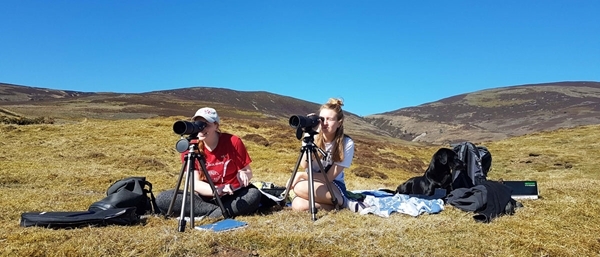“I’ve probably learnt as much, if not more than any other year of my degree,” said Ellen Knight, following her year-long undergraduate student placement with the Game & Wildlife Conservation Trust (GWCT).
One of the UK’s leading conservation charities, the GWCT is offering undergraduate students the opportunity to work in real-life conservation research. Each year the Trust hosts students studying ecology, conservation and computer science-related degrees for one-year placements as part of their degrees. Students work alongside some of the leading scientists in their subjects on important game and wildlife conservation research.

“This is an opportunity to challenge yourself in the field,” said Julie Ewald, Head of Geographical Information Systems (GIS) at the GWCT, who manages undergraduate student placements. “We encourage and expect our students to play a full and active part in our research and the valuable work they do helps to move our projects forward.”
GWCT student placements give undergraduates the chance to expand their experience in areas such as surveying birds and habitats; catching and tagging wildlife; work with pointing dogs; laboratory work; data handling, analysis and reporting; database construction; experimental design; GIS; and radio telemetry work.
As well as opportunities in conservation fieldwork, the Trust offers placements to computer science students. Previous students have modernised some of the charity’s databases, helped with manipulating and displaying information from satellite-tagged woodcock, and developed a crowd-sourced method to identify species from camera trap photos. “Our computer science placements are a great opportunity to acquire skills that are increasingly desirable in the field of computing and its application in a scientific environment,” said Julie.
Reflecting on her experience with the Trust’s Farmland Ecology unit, student Ellen said: “Coming to the Trust threw me in the deep end of working for a research organisation, and the level of trust I’ve received to carry out independent work has been brilliant. I’ve had the opportunity to hone my insect identification skills in the lab, head out all over the country on fieldwork, practise my stats and report-writing in a real-life context, and even help organise projects.”
Kit Lawson, who spent a year with the GWCT’s GIS and Wetlands teams, said: “The researchers are eager to share their knowledge with the students. I have very much enjoyed my placement and feel that it will be invaluable for my final year at university and jobs thereafter.”
The GWCT is offering sandwich placements for the 2021/22 academic year in:
- Computer Science and Wildlife Research
- Farmland Ecology
- Farmland Wildlife Conservation Research and GIS
- GIS with Wetland Research Secondment
- Lowland Game & Wildlife Research
- Scottish Demonstration Farm
- Scottish Lowland Research
- Uplands Research
- Wetlands Research
Placements are based at the GWCT’s headquarters in Fordingbridge, Hampshire and at various long-term project locations around Britain.
For more information on undergraduate student placements with the GWCT please visit www.gwct.org.uk/undergraduates, where you can find information on who is eligible and how to apply.
Applications close on 10 January 2021 unless stated otherwise on the website.
Notes to editors
The Game & Wildlife Conservation Trust – providing research-led conservation for a thriving countryside. The GWCT is an independent wildlife conservation charity which has carried out scientific research into Britain’s game and wildlife since the 1930s. We advise farmers and landowners on improving wildlife habitats. We employ 22 post-doctoral scientists and 50 other research staff with expertise in areas such as birds, insects, mammals, farming, fish and statistics. We undertake our own research as well as projects funded by contract and grant-aid from Government and private bodies. The Trust is also responsible for a number of Government Biodiversity Action Plan species and is lead partner for grey partridge and joint lead partner for brown hare and black grouse.
For information, contact:
Eleanor Williams
Telephone: 07592 025476
Email: press@gwct.org.uk